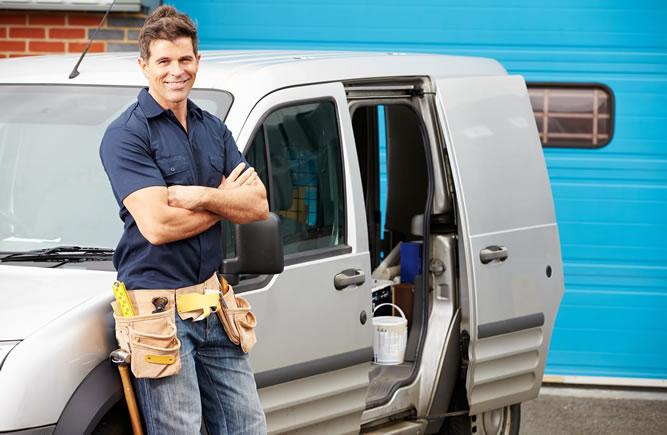Emergency Plumber Cost
Last updated 22nd May, 2025
Looking for emergency plumber call out fees?
Here we discuss everything you need to know about emergency plumbing repairs, what is considered an emergency repair and how much emergency plumbing services cost. We also look into the timeframes of different jobs as well as the supply costs.
We compare typical prices for a normal call out and those of an emergency, 24 hour plumber, so that you can feel fully informed about the likely costs.
For more information, keep reading!
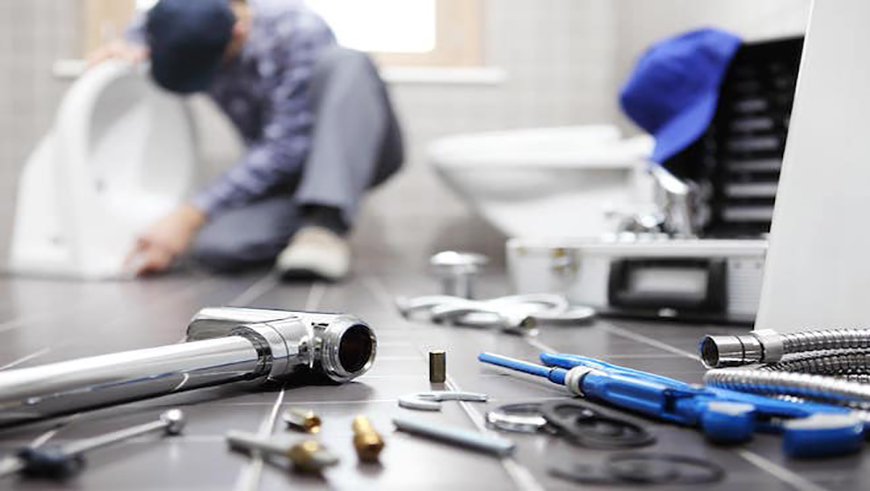
Table of Contents
- How much does it cost for emergency plumbing?
- Emergency plumber prices
- What are the costs for emergency plumbing materials?
- How much are emergency plumber call out charges?
- Cost factors of emergency plumbing
- What are plumbing emergencies?
- Blocked toilet
- Toilet replacement
- Blocked sink
- Tap replacement
- Blocked/Overflowing drain
- Leaking radiator
- Radiator replacement
- TRV installation
- Hot water tank repair
- Leaking boiler
- Boiler repair
- Burst water pipe
- Gas leak
- DIY emergency plumbing repairs
- Am I covered for a plumbing emergency?
- FAQs
- How to find and hire an emergency plumber
- Sources
How Much Is an Emergency Plumber?
The cost of hiring an emergency plumber varies according to the issue at hand, the complexity of the work involved, your location within the UK and the additional materials needed in order to complete the work.
Typically, a standard plumber would charge in the region of £200 - £350 a day in labour, with a standard call out fee in the region of £40 - £60.
In contrast, an emergency plumber call out fee is charged at 2.5 to 3 times the rate of a standard call out charge – in the region of between £100 - £180 and tends to cover the first 30 or 60 minutes of work, depending on the company used.
Emergency Plumbing Prices
Emergency callouts tend to happen when an issue suddenly occurs without prior warning, causing inconvenience and potential hazard to you and your property, leaving you with no choice but to find a plumber immediately to fix the issue.
It’s recommended that if you suspect an issue is occurring with your plumbing that you contact a plumber to investigate as soon as possible to avoid having to pay premium emergency fees in the future. Listed below is the average plumber call out fee, both standard and emergency, plus hourly rate:
| Call out type | Average cost |
|---|---|
| Standard (non-emergency) call out charge | £40 - £60 |
| Emergency call out charge | £100 - £180 |
| Hourly rate thereafter | £40-£60 |
Any plumbing incident that needs attending to outside of standard ‘working hours’ will usually incur an emergency call out fee; this can even include, depending on your plumber, weekends and bank holidays. Call out charges usually include the first 30 minutes of labour and additional charges will be made thereafter in either hourly, 30-minute or 15-minute increments.
Some of the more common emergency call out work required and estimated costings are indicated here:
| Job Description | Estimated Time | Estimated Cost |
|---|---|---|
| Boiler breakdown | 30m – 2 hours | £100 - £240 |
| Loss of boiler pressure | 30m – 2 hours | £100 - £240 |
| Blocked toilet | 30m – 4 hours | £100 - £250 |
| Blocked sink | 30m – 1 hour | £100 - £180 |
| Blocked external drains | Up to 2 hours | £200 - £300 |
| Gas leak | Dependent on the location and cause of the leak | £100 - £1000 |
It should be noted that the actual cost and timescale of the work involved will vary from case to case, so where possible it’s best to get multiple quotes to ensure the best price and professionalism to complete the work.
What Are the Costs for Emergency Plumbing Materials?
If your plumbing requires parts to be replaced as part of the fix, the materials are likely to incur an additional charge to the plumber’s labour costs. Outlined below are some of the more common replacement elements and the prices you can expect to be charged for their supply, depending on the quality chosen:
| Item | Estimated cost |
|---|---|
| Copper pipes (15mm) | £3 - £6 p/m |
| Steel pipes | £2 - £4 p/m |
| Radiators | £45 - £250 |
| New toilet | £30 - £150 |
| New sink | £30 - £150 |
Boiler issues are relatively common emergency issues, so as a guide you can expect the following costs for replacement parts, without labour:
| Item | Estimated cost |
|---|---|
| New boiler | £600 – £2,000 |
| Boiler heat exchanger | £300 – £500 |
| Boiler diverter valve | £10 – £15 |
| Boiler magnetic filter | £130 – £220 |
| Boiler gas valve | £4 – £10 |
| Boiler heating pump | £90 – £200 |
| Boiler air pressure switch | £15 – £80 |
| Boiler flue | £100 – £200 |
| Boiler timer | £55 – £80 |
| Boiler control panel | £60 - £250 |
| Boiler expansion vessel | £20 - £80 |
The above table assumes that you are paying for the items to be supplied yourself and not as part of an insurance claim.
In some cases, such as normal working hours, you may only be charged the standard call out fee depending on your service provider. Materials needed to complete the work will generally be supplied at an additional charge on top of labour.
It should also be noted that depending on whether you use an independent plumber or a company, you may pay a fixed rate for the services and repair or may be charged in 15 or 30-minute increments after the initial hour. – and depending on the nature of the issue, you may require two tradespeople to complete the work
Cost Factors of Emergency Plumbing
There are multiple factors that can affect the costs of emergency plumbing repair work, each of which you will need to consider before hiring your tradesperson.
Company or Tradesperson You Choose
Whilst there are ‘averages’ or expected fees, the charges of services are down to the individual or company you choose to hire to complete your work. Larger companies may charge per job, whereas independent plumbers may charge at an hourly rate. You should enquire about pricing structures and estimated timescales before committing to get a better understanding of the prices you can expect to pay.
Type of Job
The type of job being undertaken will affect the overall costing both in terms of materials and in terms of time. A blocked toilet that can be fixed using a plunger or toilet snake is going to cost you considerably less in time and money than having to have your home boiler replaced. More complex jobs that need completing generally take longer than straightforward fixes, and this too will have an impact on the cost of repair.
Ease of Access
Accessibility also plays a role in work costings. Repairs that are easily accessible such as a leaky tap are going to be quicker to rectify than, for example, a burst pipe beneath floorboards.

Plumber's Location
The distance plumber has to travel can add to the cost of a call out. Most plumbers operate within a certain area which will be covered in their charges – repair technicians required to travel further afield may charge a surplus for additional mileage.
Specialist Equipment Needed
If specialist equipment or materials are needed to repair or fix plumbing issues, like requiring drain jetting to unblock a waste pipe, additional charges and services may be required.
Solution Implemented
The solution implemented for the repair will affect the cost of the work; a short-term fix, or patch job, may be necessary whilst essential parts are gathered for a proper repair. If this is the case, you should check with your service provider how this will affect the overall cost of work.
Home Insurance
The cost of repairs may be covered by your home insurance. You should check your policy and what it covers – in some cases, depending on excess, it may be cheaper to pay for the repair yourself, or for larger issues making an insurance claim could help ease the costs.
What Are Plumbing Emergencies?
Plumbing emergencies are generally defined as plumbing issues that cannot be left unattended and requires immediate attention, either because of the issues they pose to the health and wellbeing of the household or the risk of damage to your property. You will need to assess your plumbing issue and decide if it constitutes an emergency or not.
Blocked Toilet
Blocked toilets are a common plumbing emergency, often posing the risk of damaging pipework if left unattended and causing inconvenience, particularly in homes with only one WC.
The Signs:
- Toilet won't flush properly
- Slow to drain or doesn't finish
- Water levels are higher than usual
- Toilet refills slowly (or not at all)
Common Causes:
- Foreign items such as toys, wet-wipes or sanitary products
- Flushing too much toilet paper in one go
- Build-up of limescale and waste materials
- Cracked or damaged pipework
Prevention Tips:
- Avoid flushing inappropriate items
- Try not to flush too much paper at once
- Clean regularly with appropriate cleaning products
- Use a plunger at any early stage of slow drainage
Cost of Repair
- Simple blockage: Around £100 if easily resolved using a plunger or toilet snake
- Complex blockage: Up to £300 if located further down the wastepipe or cannot be accessed directly
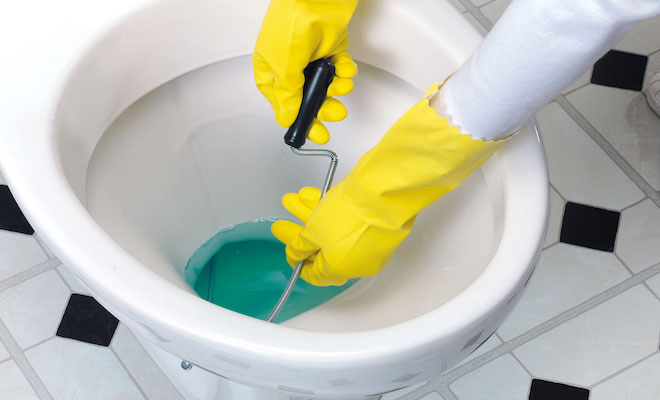
Toilet Replacement
Sometimes a toilet can be damaged beyond repair and a replacement is necessary in order to regain functionality.
The Signs:
- Regularly experiencing blockages
- Toilet frequently needs repairing
- Unit wobbles or is unstable
- Cracks are appearing in the toilet
- Water around or near your toilet
Common Causes:
- The toilet is old and well-used
- Wastepipes are an insufficient size
- Excessive build-up of waste materials
- Damage to the toilet system.
Prevention Tips
- Clean regularly with suitable cleaning products
- Resolve issues as soon as noticed, preventing further deterioration
- Use carefully and avoid excessive flushing
Cost of Repair
- New toilet bowl can cost between £30 - £300
- A plumber will charge around £200 for labour
- Additional costs may incur if pipework is damaged or needs adjusting
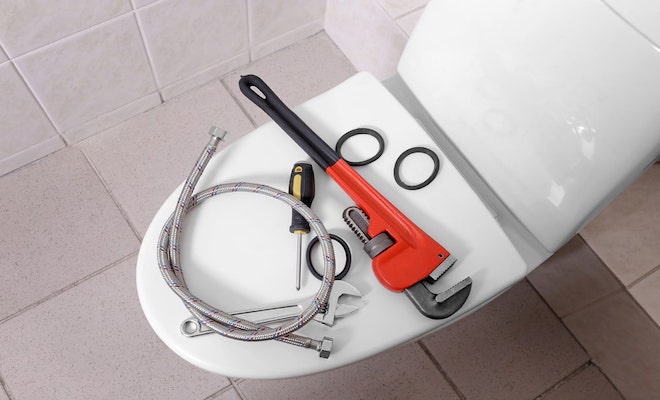
Blocked Sink
A blocked sink can cause inconvenience and bring an unpleasant smell. It’s important to have a plumber investigate the issue as if left unattended, a blockage can cause severe damage to pipework.
The Signs:
- Your sink is slow draining
- You hear gurgling as it drains
- The sink fails to drain at all
- You notice an unpleasant odour
- Fluids are backing up in your sink
Common Causes:
- Build-up of residue such as soap, grease, food or hair
- Mineral build-up such as limescale
- The pipework is too narrow or damaged
Prevention Tips:
- Regularly clean your sink and drains
- Run hot water down the sink after every use
- Avoid pouring oil or grease down your sink
- Use a drain snake (around £5) to remove build-up of hair etc
- Purchase a sink strainer (as little as £2, to prevent debris going down your drains
Cost of Repair
- Emergency plumbing to clear a blocked sink or drain can cost between £100 and £150
- Although please note prices can vary and may depend on the severity of the blockage
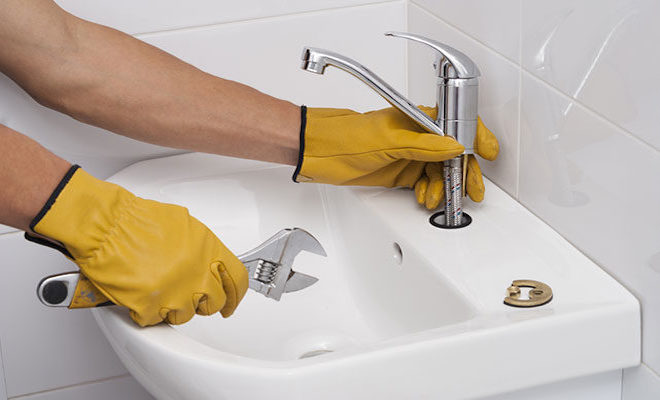
Tap Replacement
A dripping tap can cause a wastage of 45 litres a day (at a cost of roughly £55 per year), with taps and faucets known to degrade over time as their components are worn down.
The Signs:
- Taps drip consistently
- Taps are difficult to turn
- Taps are noisy during use
- Pipework is noisy or ‘clank’ during use
Common Causes:
- Damage to the valve seat
- Water pressure may be too high
- Home pipework could be damaged
- Worn O-rings, washers or gaskets
- General wear-and-tear
Prevention Tips
- Clean your taps to avoid mineral and residue build-up
- Upgrade taps to improve the quality of components
Cost of Repair
- Around £180 in labour charges to fit taps in an emergency
- £25 to £125 should the plumber need to source taps from elsewhere
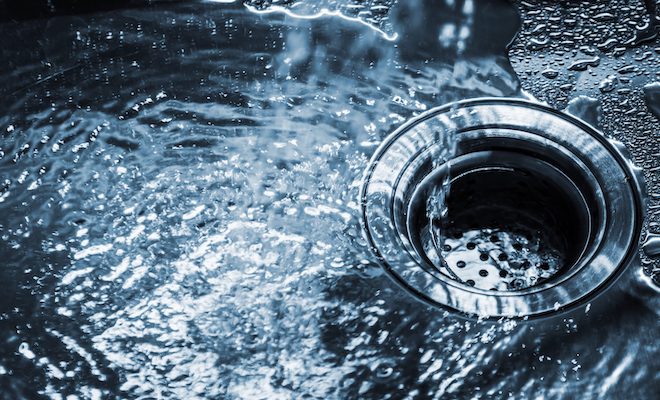
Blocked/Overflowing Drain
Overflowing or blocked drains can be an indicator that you have a severe issue on your hands that will need to be corrected before costly damage is caused.
The Signs:
- Water and waste overflowing from your drains
- You can see a blockage in your external drains
- A foul odour may be present
- Your toilet may fail to flush
- Gurgling noise when your sinks drain
Common Causes:
- Debris such as leaves may be present in your drains
- Misuse - for example flushing sanitary products or kitchen oil
- Your drains may be too small for purpose
- There may be damage in your drains or sewer connection
Prevention Tips
- Be careful not to put inappropriate materials/substances down them
- Clear debris such as fallen leaves from your external drains
- Try to avoid excess hair escaping down your drains.
Cost of Repair
- You may be required to employ a professional to unblock a draink, costing around £300 for materials and labour
- If drain blockages are a persistent issue, it may be an indication that there is a more severe issue such as a collapsed pipe
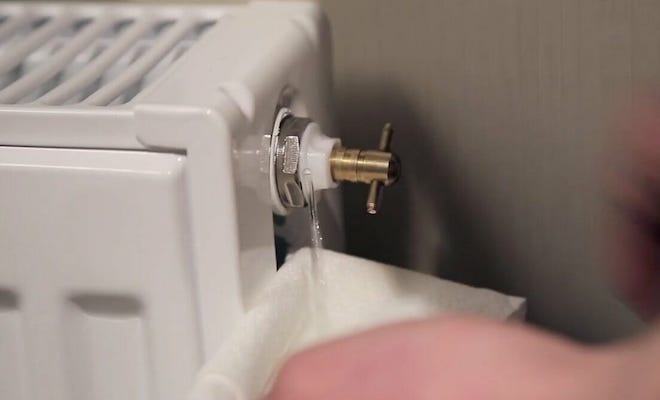
Leaking Radiator
Left unattended, a leaking radiator may need to be replaced and can cause damage to your furnishings and floors in your home.
The Signs:
- Water pooling around the radiator
- Your boiler may lose pressure
- Hissing, gurgling or knocking sounds when radiators are in use
Common Causes:
- Valves may not be sealed properly
- Potential damage to the connecting pipework
- The spindle may be loose or damaged
- Rust or corrosion to the system
Prevention Tips:
- Make sure valves are correctly sealed
- Try not to bump or knock radiators
- Consider bleeding your radiators
Cost of Repair
- Budget a minimum of £120 for the initial call out, depending on the company used
- Expect additional time charged at the plumbers’ standard hourly rate thereafter.
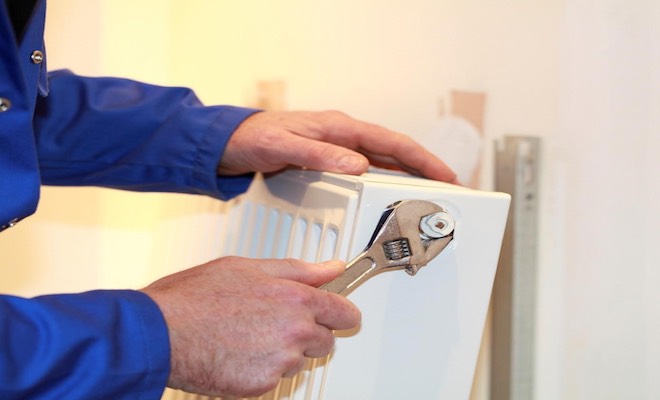
Radiator Replacement
Having an old, damaged or ineffective radiator can not only affect heating but increase the risk of damp or other concerns around your property.
The Signs:
- Radiators require frequent bleeding
- Your radiator frequently leaks
- Requires frequent repair work
- Radiator doesn't reach correct temperature
Common Causes:
- Radiator may be getting old
- May not work effectively with your current heating set-up
- The radiator may have been moved, causing damage
Prevention Tips
- Only move radiators when necessary
- Take care when handling radiators and connecting pipework
- Ensure your boiler is compatible with your radiator
Cost of Repair
- As an emergency installation, expect to pay roughly £180 – £240 in labour charges
- Plus the cost of a replacement radiator in the region of £50 – £200
TRV installation
A fault with your thermostatic radiator valve can be frustrating, particularly during the colder months when homes require heating.
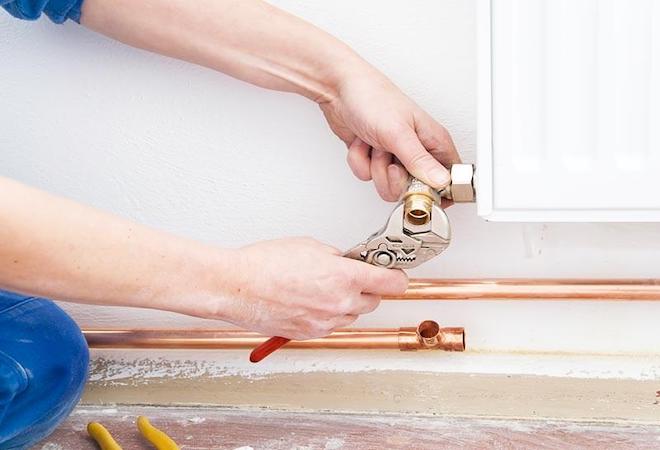
The Signs:
- Your radiators do not change temperature correctly
- If you feel no resistance when turning the valve
Common Causes:
- TRVs may get stuck in an on or off position, particularly if they have been left in position for a long period, such as during the summer.
- If your TRVs are not bidirectional, it may have been installed on the wrong side.
Prevention Tips:
- Check your TRV positioning and adjust occasionally
- Avoid knocking or dinging your radiators and TRVs
- Make sure your boiler is compatible with TRVs
- It is recommended TRVs are installed on the flow side, rather than the return
Cost of Repair
- In an emergency situation expect a charge in the region of £180 (including a replacement TRV)
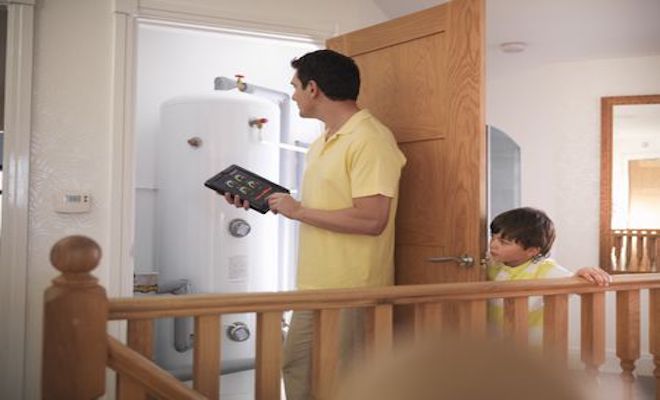
Hot Water Tank Repair
There are a number of indicators that your hot water tank may be failing and needs replacing in order for it to operate effectively and efficiently.
The Signs:
- If your hot water tank is over 10 years old, it may need replacing, though they can last for up to 30 years.
- Discoloured water is an indication that rust is present in your tank.
- Cloudy or unpleasant-smelling water can indicate a build-up of mineral sediments in the tank.
- Leaking from the tank.
- Insufficient hot water is produced.
Common Causes:
- General wear-and-tear / life expectancy of the tank.
- Sediment build up in the tank.
- Excessive internal pressure.
- Valves may be stuck.
- Thermostat may be broken.
Prevention Tips:
- Regularly flush your hot water system to avoid mineral build up.
- Test the pressure-release valve is working correctly,
Cost of Repair:
- Typically you can expect a cost of between £300 - £450 to replace a broken water tank
- You may also need to have your boiler replaced or upgraded to accommodate for this, as a like-for-like replacement is unlikely
Leaking Boiler
No-one wants to be faced with a boiler emergency, and a leak in the boiler will need to be attended to quickly to avoid serious damage to your property.
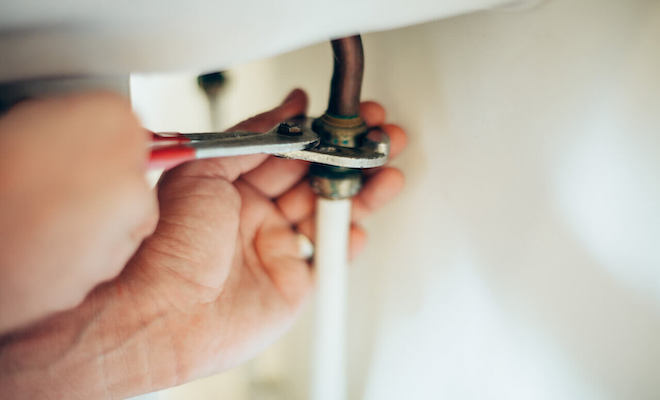
The Signs:
- Visible water pooling near your boiler
- Excessive or unusual noise when the boiler is in operation
- Slow water heating
Common Causes:
- Poor installation.
- Corroded pipework.
- Excessive pressure within the system
- Loose connections.
Prevention Tips:
- Check your pipework for signs of corrosion
- Regularly check the pressure in your boiler
Cost of Repair
- Depending on the location and cause of the leak in your boiler, you can expect an average emergency call out cost of around £120
- Your plumber or gas engineer will be able to advise you if you will likely need a replacement boiler shortly in the future
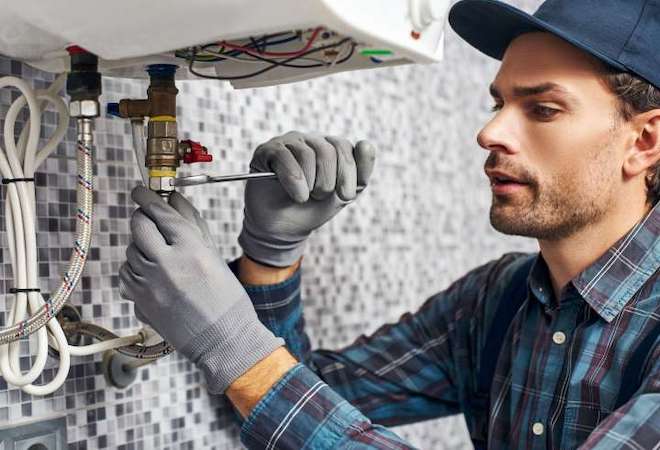
Boiler Repair
With so many components in a boiler that can go awry, a boiler emergency cannot always be avoided and should be attended to quickly when issues arise. Failing to do so could result in serious damage to your property and could cost you a lot more in the future as more issues arise.
The Signs:
- Rising heating bills
- Noisy during operation
- Leaking or hissing
- Water not heating correctly
- Radiators not operating correctly
- Unable to control temperatures
Common Causes:
- Broken components
- Components not operating correctly
- Incorrect installation
Prevention Tips:
- Have your boiler serviced annually to check for faults.
- Bleed your radiators at least yearly.
- Consider having your central heating flushed.
- Make sure your pipes are correctly insulated.
- Run your heating frequently.
Cost of Repair
- Assuming only one component has failed, repairs will cost around £100 – £240 in labour
- Replacement parts can range from as little as £4 for a replacement gas valve to upwards of £500 for a new heat exchanger
Common repair work on boilers include:
- Heat exchanger replacement.
- Diverter valve replacement.
- Magnetic filter replacement.
- Gas valves replacement.
- Fans replacement.
- Heating pump replacement.
- Air pressure switch replacement.
- Installing a new flue, or replacing the old one if it is not in an optimal location.
- Timer replacements.
- Replacement circuit boards.
In some cases you may find that it is more cost effective to have your boiler replaced entirely rather than replacing certain elements, particularly if your current boiler is old, requires multiple repairs or frequently fails to operate correctly.
Burst Water Pipe
A burst pipe can wreak havoc on your home, causing risk of damage to your property and potentially cost thousands in repair work if not dealt with quickly.
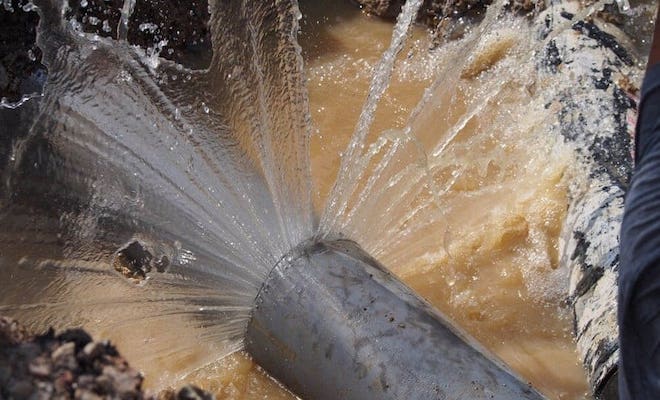
The signs:
- You have noticed an unexpected increase in your water bill.
- You notice puddles of water in your home.
- You may notice damp patches in your home, or bulging in your ceiling.
- You can hear water dripping.
- Your water supply looks or smells wrong.
- Your pipes have started to make noise.
Common Causes:
- Incorrect water pressure in your home.
- Cold weather can cause water to freeze in pipes, causing a blockage.
- Your pipes may have been knocked or punctured during tasks.
Prevention Tips
- Ensure your pipes are correctly insulated.
- Run your central heating frequently, even on low.
- Have your central heating serviced annually.
Cost of Repair
- In the region of £100 - £300 for emergency labour and materials and depending on the location of the burst and how much pipework needs to be laid
You should bear in mind that in addition to a plumber, you may also need to redecorate or re-plaster areas of your home, or even have your ceilings repaired after the work has been completed, depending the pipe location and what measures were undertaken to access the leak in the first place; all of which will incur an additional cost if you are hiring a professional to complete the work for you.
Gas Leak
A gas leak is a serious issue that will need to be addressed immediately at the first suspicion. Gas is notoriously dangerous and can result in a fire or explosion, causing serious damage to your property and has the potential to cause major health damage or even death.
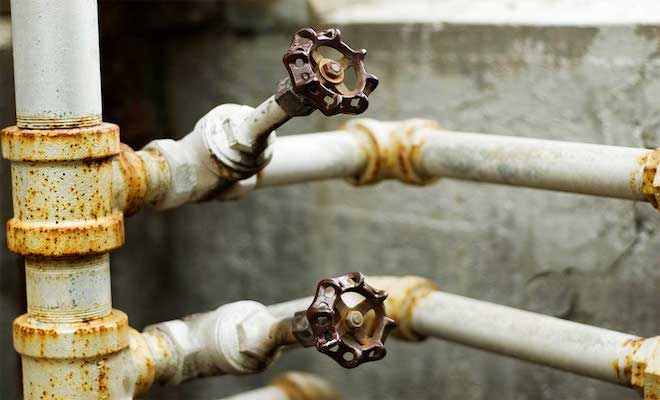
The Signs:
- You may notice a gas leak smell (usually a sulphuric or rotten egg smell).
- You notice a hissing sound near gas lines.
- You may feel dizzy or have unexplained headaches and nausea.
Common Causes:
- Poorly fitted appliances.
- Old, worn out appliances.
- Damage to the gas pipework.
Prevention Tips:
- Have your gas boiler serviced at least once a year by a registered Gas Safe engineer.
- Check your gas-operated appliances frequently for signs of damage.
- If you live in a rented property, your landlord has a legal responsibility to provide you with a copy of your gas safety certificate and ensuring checks are frequently made.
Cost of Repair
If you suspect you have a gas leak you should immediately shut your gas supply off (if safe to do so), open doors and windows in your property to air it out and leave the building.
You will need to call the National Emergency Gas Service on 0800 111 999 (for England, Wales and Scotland), preferably from a mobile phone away from the property.
Do not attempt to use electrical appliances or operate switches as they may spark, igniting the gases, and do not smoke in the area. Extinguish any open flames you have in operation, such as a hob.
The National Gas Emergency Service will send a gas technician to your property to shut off your home gas supply and assess where the leak has originated from. You will not be charged for calling the service or charged for any repair work that needs to be undertaken to the gas line on the outside of your meter connection.
If the fault is on your property, after the gas meter connection, you will likely incur a charge to have the fault fixed by a professional, who will need to sign off to say that the fault has been repaired correctly before your home gas supply can be reconnected.
The cost of repairing an internal gas leak will depend on a variety of factors including the location and could take anything from 10 minutes to a day to locate the source. You should budget a minimum of £200 to have your gas leak fixed.
DIY Emergency Plumbing Repairs
While a blocked sink or toilet may only require the use of a plunger, in the event of a more serious plumbing emergency, it is always best to call out the professionals. Trying a DIY approach to fixing complicated issues can result in creating additional damage, and in return higher repair costs.
Avoid attempting to repair gas and boiler issues unless you are qualified to do so. If you suspect you have a gas leak you should call the National Gas Emergency Service on 0800 111 999. There is no gas leak call out charge for this service.
If you do need to hire an emergency plumber it’s recommended that, where possible, you turn your water off at the mains to minimise the risk of causing further damage by built up pressure or leakage.
Likewise, if you require a gas engineer, where safe to do so, you should turn your gas off at the supply valve until your professional arrived.

Am I Covered for a Plumbing Emergency?
Whether you are covered for emergency plumbing will depend on your insurance policy.
Home emergency cover typically covers events such as burst pipes, electrical failure, boiler breakdowns, faulty heating and the like for the cost of the call out, labour, parts and materials.
In contrast to standard home insurance which, depending on your policy, may not cover emergency repairs and instead will cover the cost of damage to your home and your belongings.
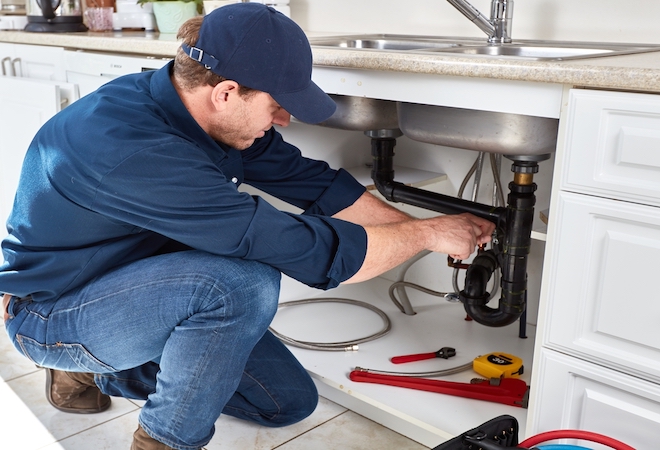
The cost to add emergency cover to your home insurance will vary according to your provider, but as a general indication, the average cost in the UK is roughly £50 a year (which works out just over £4 a month) on top of your usual insurance cost.
It’s recommended that you check your insurance policy to check what is and is not covered under the cost of your insurance.
FAQs
On the other hand, if you suspect an issue may be occurring but that is not a risk immediately, such as a mildly blocked drain, you can usually call a standard plumber who will still visit you as soon as possible, without incurring an inflated call out charge.
Emergency plumbing is needed in an emergency – which by its nature suggests it is urgent and cannot be ignored. Premiums can therefore be charged because the timing can be inconvenient to your worker and because you are, effectively, paying to ‘jump the queue’.
How to Find and Hire an Emergency Plumber
Because plumbing is an integral part of the home, you should make sure that you are hiring a qualified professional to undertake the work needed to fix your issue. There are a number of things to consider before hiring someone:
You should check that your plumber is covered under liability insurance, and preferably is able to offer a warranty on their work so that, if future issues occur with the fixing solution they have employed, they will be liable for the cost of repair.
There are a number of qualifications that your plumber may have, which are a good indication that they are well trained and experienced to deal with the plumbing issue you need attending; ask if they are accredited with any of the following:
- IPHE (Institute of Plumbing and Heating Engineering)
- APHC (Association of Heating and Plumbing Contractors)
- SNIPEF (Scottish and Northern Ireland Plumbing Employers’ Federation)
References and proof of similar work are also a good indication that the plumber is experienced and professional; you should ask your friends, neighbours and relatives if they have had similar work undertaken and if they would recommend their service provider to you.
Whilst it may be tempting to go with the first plumber you come across, or the cheapest plumber you can find, it’s recommended that you get at least three quotes (available here) to get a good indication of the cost and timeframe of the work needed.
For any works involving gas, it is crucial that you hire someone that is Gas Safety Registered. You can check whether an individual or company is registered on the HSE website here.
Sources
https://www.ciphe.org.uk/
https://www.watersafe.org.uk/
https://www.theexeterdaily.co.uk/news/homes-gardens/would-emergency-plumber-cost-me-dearly
